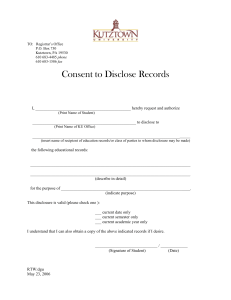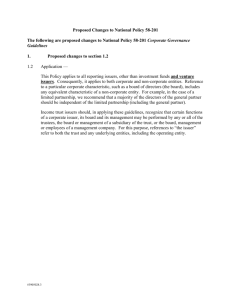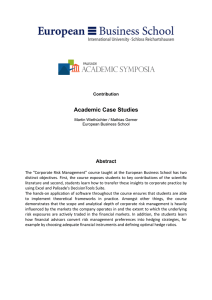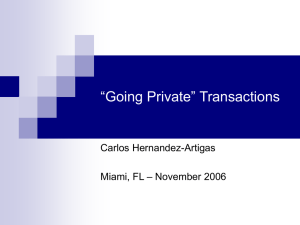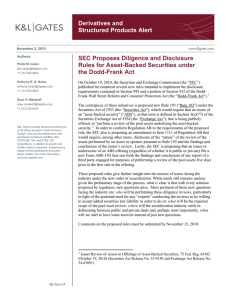SEC Proposes Rules Requiring Disclosure of
advertisement
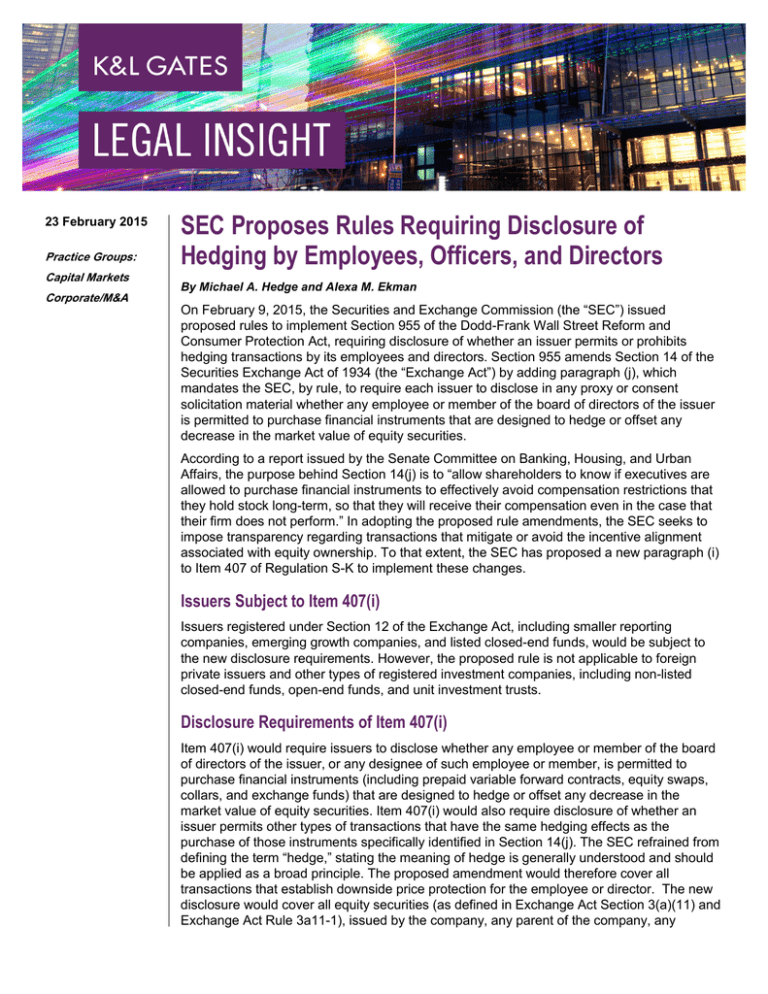
23 February 2015 Practice Groups: Capital Markets Corporate/M&A SEC Proposes Rules Requiring Disclosure of Hedging by Employees, Officers, and Directors By Michael A. Hedge and Alexa M. Ekman On February 9, 2015, the Securities and Exchange Commission (the “SEC”) issued proposed rules to implement Section 955 of the Dodd-Frank Wall Street Reform and Consumer Protection Act, requiring disclosure of whether an issuer permits or prohibits hedging transactions by its employees and directors. Section 955 amends Section 14 of the Securities Exchange Act of 1934 (the “Exchange Act”) by adding paragraph (j), which mandates the SEC, by rule, to require each issuer to disclose in any proxy or consent solicitation material whether any employee or member of the board of directors of the issuer is permitted to purchase financial instruments that are designed to hedge or offset any decrease in the market value of equity securities. According to a report issued by the Senate Committee on Banking, Housing, and Urban Affairs, the purpose behind Section 14(j) is to “allow shareholders to know if executives are allowed to purchase financial instruments to effectively avoid compensation restrictions that they hold stock long-term, so that they will receive their compensation even in the case that their firm does not perform.” In adopting the proposed rule amendments, the SEC seeks to impose transparency regarding transactions that mitigate or avoid the incentive alignment associated with equity ownership. To that extent, the SEC has proposed a new paragraph (i) to Item 407 of Regulation S-K to implement these changes. Issuers Subject to Item 407(i) Issuers registered under Section 12 of the Exchange Act, including smaller reporting companies, emerging growth companies, and listed closed-end funds, would be subject to the new disclosure requirements. However, the proposed rule is not applicable to foreign private issuers and other types of registered investment companies, including non-listed closed-end funds, open-end funds, and unit investment trusts. Disclosure Requirements of Item 407(i) Item 407(i) would require issuers to disclose whether any employee or member of the board of directors of the issuer, or any designee of such employee or member, is permitted to purchase financial instruments (including prepaid variable forward contracts, equity swaps, collars, and exchange funds) that are designed to hedge or offset any decrease in the market value of equity securities. Item 407(i) would also require disclosure of whether an issuer permits other types of transactions that have the same hedging effects as the purchase of those instruments specifically identified in Section 14(j). The SEC refrained from defining the term “hedge,” stating the meaning of hedge is generally understood and should be applied as a broad principle. The proposed amendment would therefore cover all transactions that establish downside price protection for the employee or director. The new disclosure would cover all equity securities (as defined in Exchange Act Section 3(a)(11) and Exchange Act Rule 3a11-1), issued by the company, any parent of the company, any SEC Proposes RulesRequiring Disclosure of Hedging by Employees, Officers, and Directors subsidiary of the company or any subsidiary of any parent of the company that are registered under Section 12 of the Exchange Act. The issuer would also be required to disclose the categories of transactions it permits and the categories of transactions it prohibits. If it is the case where the issuer only prohibits certain hedging transactions, the issuer would be able to disclose the categories of transactions it specifically prohibits, and disclose that it permits all other hedging transactions, in lieu of listing all of the specific categories that are permitted. The issuer would also be required to disclose whether it permits some, but not all, of its employees (including officers) and directors to engage in hedging transactions, and must disclose both the categories of persons who are permitted to hedge and those who are not. The proposed disclosure would only be required in proxy statements for meetings involving the election of directors and would not be required in registration statements under the Securities Act of 1933 or the Exchange Act, or in Form 10-K. Noting that some issuers may already be required to disclose hedging policies in their Compensation Discussion and Analysis, the SEC has proposed to amend the instructions to Item 402(b) to allow issuers to cross reference disclosures to streamline the proxy disclosure. SEC commissioners are divided on the new proposal, as both Commissioners Daniel M. Gallagher and Michael S. Piwowar have publicly expressed concern over the breadth of the disclosure. The SEC is requesting comments on items specified in its release on or before April 20, 2015. 2 SEC Proposes RulesRequiring Disclosure of Hedging by Employees, Officers, and Directors Authors: Michael A. Hedge michael.hedge@klgates.com +1.949.623.3519 Alexa M. Ekman alexa.ekman@klgates.com +1.949.623.3603 Anchorage Austin Beijing Berlin Boston Brisbane Brussels Charleston Charlotte Chicago Dallas Doha Dubai Fort Worth Frankfurt Harrisburg Hong Kong Houston London Los Angeles Melbourne Miami Milan Moscow Newark New York Orange County Palo Alto Paris Perth Pittsburgh Portland Raleigh Research Triangle Park San Francisco São Paulo Seattle Seoul Shanghai Singapore Spokane Sydney Taipei Tokyo Warsaw Washington, D.C. Wilmington K&L Gates comprises more than 2,000 lawyers globally who practice in fully integrated offices located on five continents. The firm represents leading multinational corporations, growth and middle-market companies, capital markets participants and entrepreneurs in every major industry group as well as public sector entities, educational institutions, philanthropic organizations and individuals. For more information about K&L Gates or its locations, practices and registrations, visit www.klgates.com. This publication is for informational purposes and does not contain or convey legal advice. The information herein should not be used or relied upon in regard to any particular facts or circumstances without first consulting a lawyer. © 2015 K&L Gates LLP. All Rights Reserved. 3
